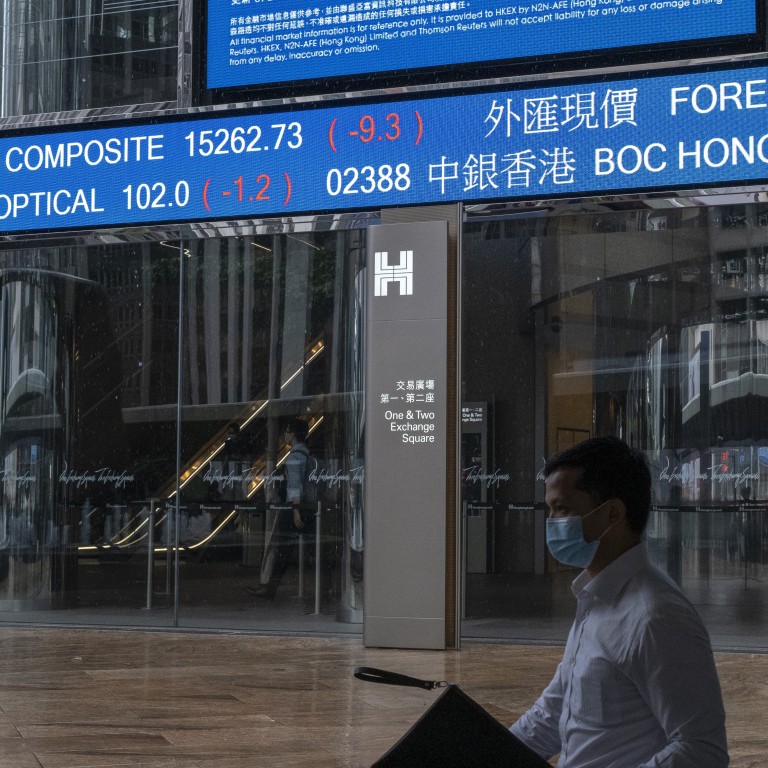
Hong Kong’s battered Hang Seng Index expected to pick up steam in second half of year. No, really
- Hong Kong’s benchmark has declined 13 per cent this year, hammered by the coronavirus
- Cheap Hang Seng Index is ‘an attractive and interesting opportunity,’ analyst says
Global fund managers are bullish on Hong Kong stocks in the second half of 2020.
Several factors will work together to push the Hang Seng Index higher, investment officers say. They include a weakening US dollar, increasing capital inflow from mainland China, as well as dirt-cheap valuations in the Hong Kong market.
The city’s benchmark had a dreadful six months filled with troubles, from one of the worst pandemics in human history to uncertainties over the city’s future after Beijing unveiled its effort to introduce a controversial national security law.
The benchmark has declined 13 per cent so far this year, entering a bear market and lagging behind the performance of China and US markets, which have been supported by a more resilient economy and massive monetary easing, respectively. The Shanghai Composite Index has fallen 2 per cent, while the CSI 300 index has gained 1 per cent. In the US, the S&P 500 has declined 6.8 per cent.
Credit Suisse has set a target of 26,000 for the Hang Seng Index in the next three to six months, a 5.9 per cent upside from its current level. It started the year at 28,189.75.
Asia’s third-largest stock market will benefit from continued softness in the US dollar, as it will bring more risk-on international capital into the city’s bourse, according to fund managers.
The US Federal Reserve has announced measures to inject as much as US$2.3 trillion liquidity into the market since the global outbreak of the virus, far exceeding its rescue in the aftermath of the global financial crisis in 2008.
This means there will be ample capital flowing around and seeking higher interest rates in markets such as Hong Kong and China, as growth in developed countries become increasingly scarce.
Meanwhile, bond yields will also trend lower, prompting investors to become more prone to risks.
In Hong Kong, the de facto central bank has stepped into the market many times since April to sell HK$50 billion in Hong Kong dollars, to defend the currency’s peg to the US dollar, as capital continued flowing into the city.
In China, the renminbi is also likely to moderately strengthen or stabilise in the rest of the year, according to Credit Suisse forecast.
“That’s pretty good news for these stocks,” said Sean Taylor, chief investment officer for Asia-Pacific and emerging market equities at German asset management firm DWS.
For markets like China, “a main driver will be the coming of local investors,” he said. DWS is overweight on China stocks, and prefers benchmarks like MSCI China and CSI 300 to MSCI Hong Kong, as the latter is more exposed to the city’s weaker economy.
The cheap valuation of Hong Kong stocks is one more reason to buy into the market, analysts say. The price-to-earnings (PE) ratio of the Hang Seng Index is 10.5, compared to 21.2 for the S&P 500. The gap between the two increased after the sell-off in March.
Global investors have become “absurdly” optimistic about growth stocks, such as US technology companies, that have soared in the fallout of the pandemic, according to Hong Hao, head of research and chief strategist at Bocom International.
Hong Kong stocks have long-term investment value, he said, after the benchmark plunged to a low point in March.
To be sure, Hong Kong stocks still face many headwinds.
Despite the challenges, fund managers and analysts have encouraged investors to put their money into the technology and pharmaceutical sectors.
Bocom International analysts recommended Chinese internet stocks, and named Alibaba Group, the country’s top e-commerce platform operator and the owner of the South China Morning Post, as the best company to invest in this sector.
Alibaba will benefit from a booming e-commerce industry empowered by live streaming, which became popular during the lockdown period, according to the brokerage. It forecasts Alibaba’s sales value from e-commerce will grow 15 per cent in 2021.
Alibaba increased its market share during the pandemic, according to the analysts, who have set a target price of HK$265, representing a more than 23 per cent upside from its Friday close price.
Meanwhile, health care stocks are also likely to continue outperforming because people are more motivated to spend on maintaining healthy after the pandemic, according to Bocom’s Hong.
Bocom International recommends Chinese drug maker Sino Biopharmaceutical, and predicted its profit will rise 20 per cent between 2019 and 2022. The target price is set at HK$15.55, or 6.5 per cent higher than its Friday close.

